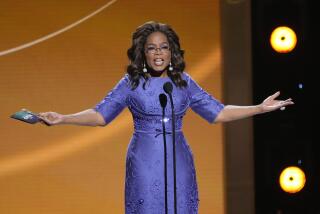Oprah exacts her pound of flesh
HELL hath no fury like a chat diva scorned.
Thatâs what writer and fraud merchant James Frey and his publisher, Nan A. Talese, discovered Thursday, when Oprah Winfrey summoned them onto her popular talk show for a verbal flogging that was about as purposeful and raw as anything thatâs ever been done on television. It might have been easier if Oprah actually had vivisected the wretched pair. Real blood would have been a welcome distraction. As it was, there was just humiliation hanging like a cloud of emotional acid over the Chicago soundstage.
Frey, youâll recall, is the author of the memoir âA Million Little Pieces,â which recounts his purported descent into alcohol and drug addiction, violent criminality and jail, followed by recovery and redemption. Part of the taleâs attraction was Freyâs claim that he accomplished this through a sort of Nietzschean act of solitary will that put the lie to conventional therapies and treatments. When Winfrey put her imprimatur on the story by selecting it for her book club and interviewing the author on air, viewers found it an attractive enough message to send âA Million Little Piecesâ streaking to the top of the bestseller lists. In the 90 days following Winfreyâs endorsement, the book sold more than 2 million copies, which made it last yearâs second most widely purchased hardcover.
But as the Smoking Gun website and others reported earlier this month, virtually none of it is true. Frey is an ex-frat boy who developed garden-variety problems with drugs and drinking, spent a few hours in jail on minor charges and was sent to an expensive private rehab hospital by his middle-class parents. Not much of a memoir in that, so he made one up -- complete with a tragic addict love interest, who hangs herself when waiting for him to get out of the slammer becomes too much to bear.
When all this came to light, Frey and his mother went on CNNâs âLarry King Liveâ show to assert his bookâs âessential truth,â and Winfrey called in to support them. The roof fell in on them all, so Thursday Winfrey apologized to her viewers for making the call and then proceeded to flay Frey and Talese.
These ceremonies of humiliation -- usually self-abnegating confessions of one sort or another -- are pretty standard fare on the reality/talk-show circuit. Itâs a little stunning, though, when reality, as in truth, breaks out amid reality, as in a lucrative television formula. Still, it would not have been TV and it certainly wouldnât have been Oprah if it all didnât end on a note of life-affirming hope. So in the showâs final moments, Frey wistfully made the requisite proclamation: âIf I come out of this experience with anything, itâs being a better person and learning from my mistakes and making sure that I donât repeat them.â Oprah looked on, sternly satisfied.
Fair enough, though âbetterâ is one of those relative sorts of words, and itâs highly unlikely that Frey will get the chance to contrive another volume of phony memoirs.
The traditional formula for absolution, which is pretty much what everybody seems to be after here, requires three things: You must be contrite; you must have a âfirm purpose of amendmentâ; and you must do penance.
Peddling a fraudulent autobiography is a nasty literary prank. Itâs wrong to trick people about a dead girlfriend or to betray readersâ trust. The damage done by those things, however, is ephemeral and hard to remedy. But Frey did something more: He suggested to alcoholics and drug addicts that they could throw over psychologically sound and medically approved therapies and follow his alleged path to sobriety. That advice, grounded in a vulgarly cinematic personal story, was what made his book resonant for so many readers. To the extent that any of those people followed the advice Frey cooked up out of his harrowingly fictional life, they may well have been hurt in substantive ways.
How do you make up for something like that?
About money, not truth
âA Million Little Piecesâ has made Frey a very rich writer. His publisher is an imprint of Doubleday & Anchor Books, which is a division of Random House. Its profits on this scam certainly are substantial. So why donât both author and publisher disgorge some substantial part of the money theyâve made through deceit -- albeit unintentional on the publishersâ part -- and donate it to some worthy recovery facility or similar charity?
That isnât going to happen, because what occurred this week wasnât about truth or contrition; it was about money.
Winfreyâs business packages charm and credibility into influence and then retails it on a vast scale at staggering profit. She can appear human and vulnerable -- in fact, it probably enhances her âconnectionâ with her audience -- but she canât afford to look like a chump. Her impulsive call to the âLarry King Liveâ show made her appear to be exactly that. The danger to the bottom line was clear and present, and Oprah, the CEO, responded in textbook fashion. If Kenneth L. Lay had been this adroit at damage control, Enron still would be Houstonâs most admired company.
Her interest in putting the Frey debacle to rest in her viewersâ minds is pretty clear, but what possessed the writer and his publisher to subject themselves to a humiliating public tongue-lashing?
Itâs possible that it was simply an act of conscience. On the other hand, you donât have to imagine anything nearly as far-fetched as Freyâs memoir to envision a sequence that went something like this: Random Houseâs lawyers suggested to the writer -- or perhaps his representatives -- that if he didnât get his worthless carcass onto Winfreyâs couch there might be legal recourse. Talese is too much of a pro not to understand that, as one of Random Houseâs most admired editors, she had to take one for the team. As the sales numbers for âA Million Little Piecesâ demonstrate once again, Winfreyâs stamp of approval is one of the few things still guaranteed to move books off the shelves.
No publisher can afford to alienate her, and thatâs precisely what Random House was in danger of doing. As it emerged on Thursdayâs show, shortly after Winfrey initially interviewed Frey, her producers were contacted by one of his former hospital counselors. He told them that the writerâs account of events there wasnât true. Winfreyâs staff asked Random House: Who was telling the truth?
âWe asked if you, your company, stood behind Jamesâ book as a work of nonfiction at the time,â Winfrey reminded Talese on Thursday, âand they said âabsolutely.â â
Talese, who looked as if she were suffering through the root canal without novocaine that Frey claimed to have undergone, admitted that although her lawyers had examined Freyâs manuscripts for libel, no attempt was made to verify any of its facts. Winfrey sputtered as if that was news to her, but itâs hard to believe she didnât know that was the case. Itâs widely known that implicit trust in a writerâs manuscript is one of the few traditions that have survived from publishingâs genteel past into this era of corporate ownership because it holds down costs. Itâs one of those rare instances when civility and economy conveniently coincide -- in this case, disastrously.
It would be reassuring to believe that this whole sorry sequence would motivate nonfiction publishers to spend a few thousand dollars to do rudimentary fact-checking on the manuscripts they intend to sell as true. Donât hold your breath. Once the current spasm of âsoul searchingâ has run its course and Frey has receded into well-earned obscurity, the only lesson the publishing industry is likely to retain is:
Oprah giveth, and Oprah taketh away.
More to Read
Sign up for our Book Club newsletter
Get the latest news, events and more from the Los Angeles Times Book Club, and help us get L.A. reading and talking.
You may occasionally receive promotional content from the Los Angeles Times.








